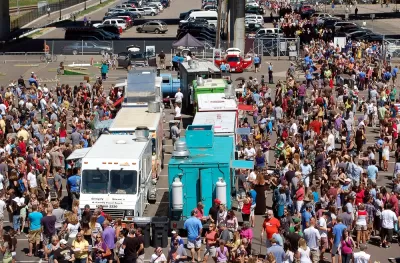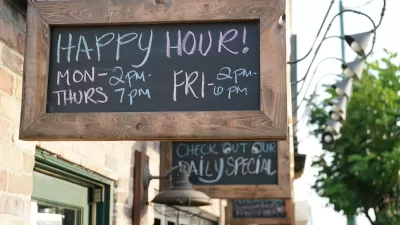Downtown property owners are clashing with food truck operators over where the latter should park their businesses.

As mobile merchants, food trucks encounter practical and regulatory questions that neither other vehicles nor other vendors contend with. Now Minneapolis is trying to balance the needs of food trucks and property owners in its Downtown area.
Property owners want to limit the number of trucks that can operate in the same area. But food truck operators say business is best when they vend together, creating a "destination." They also want to expand the areas they can operate in, as well as the hours, to serve people leaving bars at closing time.
The city, according to MinnPost, comes down in the middle. It amended a local ordinance on food trucks in January—imposing some restrictions and removing others.
Some regulations are there for safety: Trucks can’t park in a space with a bike lane between it and the curb, which would put moving cyclists between the truck and the customer on the sidewalk.
Others—like prohibiting trucks from operating near fairs, parks, or sports stadiums—protect brick-and-mortar vendors from competition.
Though property owners say City Hall is soft on food trucks because of their popularity, the reporter says both mobile and stationary eateries appear to be thriving.
FULL STORY: Does Minneapolis have too many — or too few — rules governing food trucks?

Maui's Vacation Rental Debate Turns Ugly
Verbal attacks, misinformation campaigns and fistfights plague a high-stakes debate to convert thousands of vacation rentals into long-term housing.

Planetizen Federal Action Tracker
A weekly monitor of how Trump’s orders and actions are impacting planners and planning in America.

Chicago’s Ghost Rails
Just beneath the surface of the modern city lie the remnants of its expansive early 20th-century streetcar system.

Bend, Oregon Zoning Reforms Prioritize Small-Scale Housing
The city altered its zoning code to allow multi-family housing and eliminated parking mandates citywide.

Amtrak Cutting Jobs, Funding to High-Speed Rail
The agency plans to cut 10 percent of its workforce and has confirmed it will not fund new high-speed rail projects.

LA Denies Basic Services to Unhoused Residents
The city has repeatedly failed to respond to requests for trash pickup at encampment sites, and eliminated a program that provided mobile showers and toilets.
Urban Design for Planners 1: Software Tools
This six-course series explores essential urban design concepts using open source software and equips planners with the tools they need to participate fully in the urban design process.
Planning for Universal Design
Learn the tools for implementing Universal Design in planning regulations.
planning NEXT
Appalachian Highlands Housing Partners
Mpact (founded as Rail~Volution)
City of Camden Redevelopment Agency
City of Astoria
City of Portland
City of Laramie





























